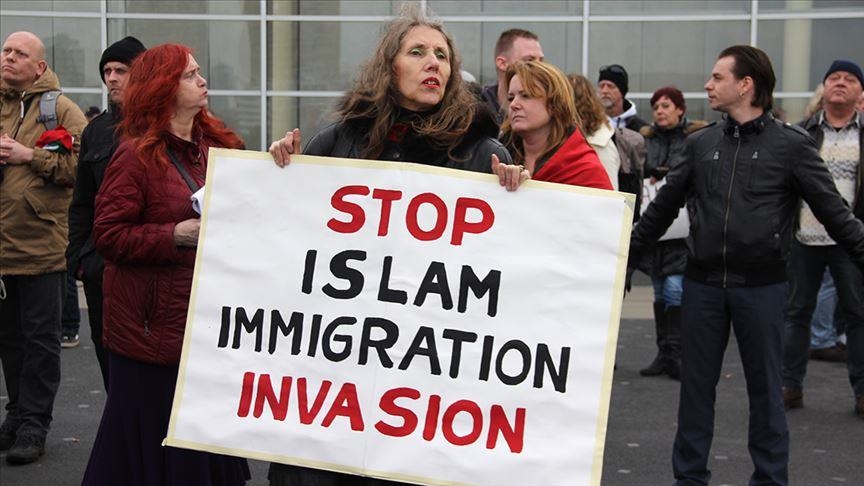Islamophobia in Europe 'has worsened' in 2020: Report
French President Emmanuel Macron features on cover of this year's report due to his policies, say co-editors

ISTANBUL
Islamophobia in Europe "has worsened, if not reached a tipping point," according to a new report released on Wednesday.
The 886-page report titled European Islamophobia Report 2020 was co-edited by Enes Bayrakli, an international relations professor at Istanbul-based Turkish-German University, and Farid Hafez, a political scientist from Georgetown University's Bridge Initiative.
"Looking back at the last six years, many observers will unanimously agree that the state of Islamophobia in Europe not only has not improved but has worsened, if not reached a tipping point," they wrote in the annual report being published since 2015.
The editors said it was one of the reasons why they picked an image of a politician for the front cover of this year's edition, which features French President Emmanuel Macron – a politician, who they said "is widely regarded as representing a centrist and mainstream political movement."
"This very fact serves as a further revelation that the center has become more extreme in relation to Islamophobia. French and Austrian Muslims have been left in the hands of brutal state violence that has been legitimized in the name of counterterrorism laws," they asserted.
The closure of the French monitoring body Collectif contre l'islamophobie en France (CCIF, Collective Against Islamophobia in France), they said, sets an example of "how far state Islamophobia has developed."
Meanwhile, an online panel discussion titled Islamophobia and the Attack on Civil Liberties in Europe was held to mark the launch of the report.
The discussion was moderated by Bayrakli and attended by Hafez, as well as Amani Hassani of UK-based Keele University and Amina Smits of Istanbul 29 Mayis University.
Bayrakli echoed the report in saying that Macron appears on the cover of the report due to his policies. He was referring to an anti-separatism law in France, which the government claims is intended to strengthen France's secular system, while critics believe that it restricts religious freedom and marginalizes Muslims.
The legislation has been criticized for targeting France's Muslim community – the largest in Europe, with 3.35 million members – and imposing restrictions on many aspects of its members' lives.

New era of 'institutionalized Islamophobia'
Hafez, for his part, talked about Islamophobia in France, Germany, and Austria.
"Germany has overall documented more than 31,000 cases of hate crimes, including 901 anti-Muslim hate crimes," he said, adding France at the very same time has recorded only 1,142 total cases of hate crimes including 235 cases against Muslims.
"So rather than suggesting that hate crimes against Muslims have more in Germany than in France, one is rather inclined to question how seriously the French police authorities document hate crimes in general," he stated.
Hafez also mentioned the front cover of the report, explaining why they chose a single person for it while the COVID-19 has a lasting impact in 2021.
"Because we think that in 2020 there is a new era in the institutionalization of state Islamophobia that we can observe," he said.
For their parts, Hassani explained the situation in Denmark, while Smits gave information about the Netherlands, which they also mentioned in the report.
This year's issue gathered 37 local scholars, experts, and civil society activists specialized in racism and human rights, besides 31 country reports, and investigates in detail the underlying dynamics that directly or indirectly support the rise of anti-Muslim racism in Europe in 2020.
The report is supported by the International Islamophobia Studies and Research Association (IISRA), Othering and Belonging Institute at the University of California, the Center for Security, Race, and Rights at Rutgers University, International Islamophobia Studies Center, the Islamophobia Research and Documentation Project (IRDP) at the Center for Race and Gender at University of California, the Arab and Muslim Ethnicities and Diasporas (AMED) Studies at San Francisco State University, and Leopold Weiss Institute.
Anadolu Agency website contains only a portion of the news stories offered to subscribers in the AA News Broadcasting System (HAS), and in summarized form. Please contact us for subscription options.

